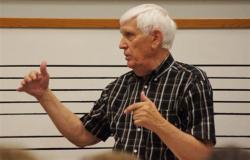Planning worship?
Check out our sister site, ZeteoSearch.org,
for 20+ additional resources related to your search.
- |
User Links
Search Results
Calling the Prodigal
Author: C. H. G. Appears in 121 hymnals Hymnal Title: Revival Praises First Line: God is calling the prodigal, come without delay Refrain First Line: Calling now for thee Lyrics: 1 God is calling the prodigal, come without delay,
Hear, O hear Him calling, calling now for thee;
Tho' you've wandered so far from His presence, come today,
Hear His loving voice calling still.
Chorus:
Calling now for thee,
O weary prodigal come;
Calling now for thee,
O weary prodigal come.
2 Patient, loving, and tenderly still the Father pleads,
Hear, O hear Him calling, calling now for thee;
Oh! return while the Spirit in mercy intercedes,
Hear His loving voice calling still. [Chorus]
3 Come, there's bread in the house of thy Father, and to spare,
Hear, O hear Him calling, calling now for thee;
Lo! the table is spread and the feast is waiting there,
Hear His loving voice calling still. [Chorus]
Used With Tune: [God is calling the prodigal, come without delay]
Calling the Prodigal
[God is calling the Prodigal]
Appears in 81 hymnals Composer and/or Arranger: Chas. H. Gabriel Hymnal Title: Small Church Music Incipit: 55534 56715 12332 Used With Text: Calling now for thee, O weary prodigal, come;
[God is calling the Prodigal]
Calling the prodigal
Author: Charles H. Gabriel Hymnal: A Messenger for Jesus #d64 (1913) Hymnal Title: A Messenger for Jesus First Line: God is calling the prodigal Refrain First Line: Calling now for thee, O weary prodigal, come Languages: English
Calling the prodigal
Calling the prodigal
Author: Charles H. Gabriel Hymnal: Abiding Songs #d32 (1936) Hymnal Title: Abiding Songs First Line: God is calling the prodigal Refrain First Line: Calling now for thee, O weary prodigal, come Languages: English
Calling the prodigal
Calling the Prodigal
Author: C. H. G. Hymnal: Assembly Songs #98 (1910) Hymnal Title: Assembly Songs First Line: God is calling the prodigal, come without delay Refrain First Line: Calling now for thee Languages: English Tune Title: [God is calling the prodigal, come without delay]
Calling the Prodigal
Jack Boyd

b. 1932 Hymnal Title: Great Songs of the Church (Revised) Arranger of "God is Calling the Prodigal" in Great Songs of the Church (Revised) Jack Arthur Boyd (b. Indianapolis, Indiana, February 9, 1932) was the music editor of *Great Songs of the Church, Revised*, published by ACU Press in 1986. He earned a B.S. degree in music education from Abilene Christian University, a masters degree in music composition and theory from the University of North Texas, and a Ph.D. in choral literature from the University of Iowa. Boyd edited *Children, Rejoice!* (Sweet, 1979) and he authored *Rehearsal Guide for the Choral Director* (Parker, 1970) and *Leading the Lord's Singing* (Quality, 1981). He is a member of Churches of Christ and lives in Abilene, Texas.
Monty Lynn
Jack Boyd
Chas. H. Gabriel

1856 - 1932 Person Name: C. H. G. Hymnal Title: Revival Praises Author of "Calling the Prodigal" in Revival Praises Pseudonyms: C. D. Emerson, Charlotte G. Homer, S. B. Jackson, A. W. Lawrence, Jennie Ree
=============
For the first seventeen years of his life Charles Hutchinson Gabriel (b. Wilton, IA, 1856; d. Los Angeles, CA, 1932) lived on an Iowa farm, where friends and neighbors often gathered to sing. Gabriel accompanied them on the family reed organ he had taught himself to play. At the age of sixteen he began teaching singing in schools (following in his father's footsteps) and soon was acclaimed as a fine teacher and composer. He moved to California in 1887 and served as Sunday school music director at the Grace Methodist Church in San Francisco. After moving to Chicago in 1892, Gabriel edited numerous collections of anthems, cantatas, and a large number of songbooks for the Homer Rodeheaver, Hope, and E. O. Excell publishing companies. He composed hundreds of tunes and texts, at times using pseudonyms such as Charlotte G. Homer. The total number of his compositions is estimated at about seven thousand. Gabriel's gospel songs became widely circulated through the Billy Sunday-Homer Rodeheaver urban crusades.
Bert Polman
Chas. H. Gabriel


 My Starred Hymns
My Starred Hymns


